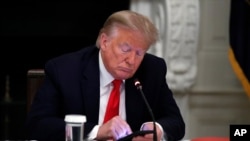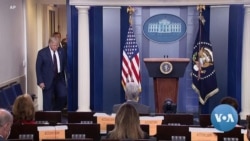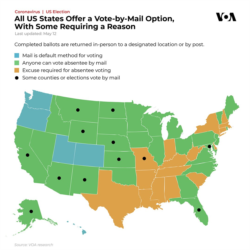U.S. President Donald Trump says he does not want to wait “weeks, months or even years” for the results of this November’s election because of problems he predicts will occur with mailed-in ballots.
"I don't want a delay,” Trump told reporters Thursday afternoon at the White House. “But I also don't want to have to wait for three months and then find out that the ballots are all missing, and the election doesn't mean anything. ... Smart people know it. Stupid people may not know it."
Earlier in the day, Trump suggested delaying this year's presidential election, alleging on Twitter, without evidence, that mailed ballots, which take longer to count, would make the 2020 presidential balloting the “most INACCURATE & FRAUDULENT Election in history.”
The Republican president added, “It will be a great embarrassment to the USA. Delay the Election until people can properly, securely and safely vote???”
The president does not have the power to delay the election. Under the U.S. Constitution, Congress has the power to choose the timing of the election. And by law it is the first Tuesday after the first Monday in November.
Republican lawmakers were quick to reject any notion the election could or would be delayed.
“Never in the history of the Congress, through wars, depressions and the Civil War, have we ever not had a federally scheduled election on time, and we’ll find a way to do that again this November 3rd,” Senate Majority Leader Mitch McConnell told WNKY-TV in his home state of Kentucky.
The chairman of the Senate’s Judiciary Committee, Lindsey Graham, said that while he was worried about election fraud, that did not warrant postponement.
“Delaying the election is not the right answer,” Graham told reporters.
"There will be no delay” of this year’s presidential election, tweeted Representative Rodney Davis of Illinois.
“Congress sets the election date, and it should not be changed. It will be held on November 3rd, as planned and required by law,” added Davis, who is the ranking Republican on the House Administration Committee, which has jurisdiction over the presidential election.
This is not an idea anyone, especially the president, should float, cautioned Ari Fleischer, who was a White House press secretary in the administration of President George W. Bush, a Republican.
Senate Minority Leader Chuck Schumer said that the president was attempting to “divert from his abject failure in the coronavirus crisis.”
House Speaker Nancy Pelosi responded by tweeting Article II, Section 1 of the U.S. Constitution: “The Congress may determine the Time of choosing the Electors, and the Day on which they shall give their Votes; which Day shall be the same throughout the United States.”
Election officials, civil rights groups and historians also criticized the president’s suggestion.
“No, Mr. President. No. You don't have the power to move the election. Nor should it be moved,” tweeted Federal Election Commissioner Ellen Weintraub, a Democratic appointee. “States and localities are asking you and Congress for funds so they can properly run the safe and secure elections all Americans want. Why don't you work on that?”
A spokesman for the Trump reelection campaign, Hogan Gidley, explained that the president “is just raising a question about the chaos Democrats have created with their insistence on all mail-in voting. They are using coronavirus as their means to try to institute universal mail-in voting, which means sending every registered voter a ballot whether they asked for one or not.”
Gidley, in a statement to VOA, added that “voter rolls are notoriously full of bad addresses for people who have moved, are noncitizens, or are even deceased. Universal mail-in voting invites chaos and severe delays in results, as proven by the New York congressional primary, where we still don’t know who won after more than a month.”
“The president’s baseless attacks on the integrity of mail-in voting are grossly irresponsible and must end before any further damage to public confidence is done,” said Michael Abramowitz, president of Freedom House, a U.S. government-funded organization focused on democracy, political freedom and human rights.
“It is extremely unusual, in the United States or anywhere in the world, for an incumbent leader to predict fraud in his own bid for reelection,” noted Abramowitz.
“It’s a desperate attempt to distract attention from the worsening COVID-19 crisis and an imploding economy,” said presidential historian David Cohen, a political science professor at the University of Akron.
“Trump has attempted to destroy confidence in American institutions and norms from the very beginning, even right after the 2016 election — an election he won — by claiming falsely that millions of people voted illegally. He knows he may well lose in 2020 but is trying to get his supporters not to believe the results. It’s right out of George Orwell’s '1984': ‘The party told you to reject the evidence of your eyes and ears,’ ” Cohen told VOA.
Polls indicate Trump is significantly trailing presumptive Democratic Party nominee Joe Biden in key battleground states.
Biden previously suggested Trump would try to delay the election.
"Mark my words — I think he is going to try to kick back the election somehow, come up with some rationale why it can't be held," Biden said at a virtual fundraiser April 24.
Both the National Association of State Election Directors and the National Association of Secretaries of State told VOA on Thursday that they were unaware of any developments that could have an impact on the security of this year’s election.
National Security correspondent Jeff Seldin and Congressional correspondent Katherine Gypson contributed to this report.








